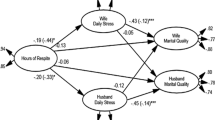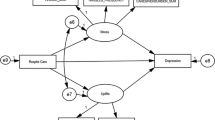Abstract
Parents of children with autism spectrum disorders (ASD) are at risk for having higher stress and lower marital quality than other parents. Survey data regarding respite care, marital quality, and daily hassles and uplifts were obtained from 101 mother-father dyads who were together raising at least one child with ASD (total # of children = 118). Number of hours of respite care was positively related to improved marital quality for both husbands and wives, such that a 1-h increase in weekly respite care was associated with a one-half standard deviation increase in marital quality. This relationship was significantly mediated by perceived daily stresses and uplifts in both husbands and wives. More respite care was associated with increased uplifts and reduced stress; increased uplifts were associated with improved marital quality; and more stress was associated with reduced marital quality. The number of children in the family was associated with greater stress, and reduced relational quality and daily uplifts. Results suggest policymakers and practitioners should develop supports for providing respite for families raising children with ASD.




Similar content being viewed by others
References
Baillargeon, R. H., Bernier, J., & Normand, C. L. (2011). The challenges faced by caregivers of children with impairments of psychological functions: A population-based cross-sectional study. Canadian Journal of Psychiatry, 56, 614–620.
Barker, E. T., Hartley, S. L., Seltzer, M. M., Floyd, F. J., Greenberg, J. S., & Orsmond, G. I. (2011). Trajectories of emotional well-being in mothers of adolescents and adults with autism. Developmental Psychology, 47, 551–561. doi:10.1037/a0021268.
Benson, P., Karlof, K. L., & Siperstein, G. N. (2008). Maternal involvement in the education of young children with autism spectrum disorders. Autism: The International Journal of Research and Practice, 12, 47–63.
Bose, R. (1991). The effect of a family support model on maternal mental health of mothers caring for children with mental handicaps. Research Policy and Planning, 9, 2–8.
Brobst, J. B., Clopton, J. R., & Hendrick, S. S. (2009). Parenting children with autism spectrum disorders: The couple’s relationship. Focus on Autism Other Developmental Disabilities, 24, 38–49. doi:10.1177/1088357608323699.
Busby, D. M., Christensen, C., Crane, D. R., & Larson, J. H. (1995). A revision of the Dyadic Adjustment Scale for use with distressed and nondistressed couples: Construct hierarchy and multidimensional scales. Journal of Marital and Family Therapy, 21, 289–308. doi:10.1111/j.1752-0606.1995.tb00163.x.
Cowan, P. S., & Reed, D. A. (2002). Effects of respite care for children with developmental disabilities: Evaluation of an intervention for at risk families. Public Health Nursing, 19, 272–283.
Crowe, T. K., & Florez, S. I. (2006). Time use of mothers with school-age children: A continuing impact of a child’s disability. American Journal of Occupational Therapy, 60, 194–203.
Dabrowska, A., & Pisula, E. (2010). Parenting stress and coping styles in mothers and fathers of pre-school children with autism and Down syndrome. Journal of Intellectual Disability Research, 54, 266–280. doi:10.1111/j.1365-2788.2010.01258.x.
Davis, N. O., & Carter, A. S. (2008). Parenting stress in mothers and fathers of toddlers with autism spectrum disorders: Associations with child characteristics. Journal of Autism and Developmental Disorders, 38, 1278–1291. doi:10.1007/s10803-007-0512-z.
Dillenburger, K., Keenan, M., Doherty, A., Byrne, T., & Gallagher, S. (2010). Living with children diagnosed with autistic spectrum disorder: Parental and professional views. British Journal of Special Education, 37, 13–23. doi:10.1111/j.1467-8578.2010.00455.x.
Dillenburger, K., & McKerr, L. (2011). “How long are we able to go on?” Issues faced by older family caregivers of adults with disabilities. British Journal of Learning Disabilities, 39, 29–38. doi:10.1111/j.1468-3156.2010.00613.x.
Doig, J. L., McLennan, J. D., & Urichuk, L. (2009). ‘Jumping through hoops’: Parents’ experiences with seeking respite care for children with special needs. Child: Care Health and Development, 35, 234–242. doi:10.1111/j.1365-2214.2008.00922.x.
Estes, A., Munson, J., Dawson, G., Koehler, E., Zhou, X., & Abbott, R. (2009). Parenting stress and psychological functioning among mothers of preschool children with autism and developmental delay. Autism, 13, 375–387. doi:10.1177/1362361309105658.
Fraley, R. C., Waller, N. G., & Brennan, K. A. (2000). An item response theory analysis of self-report measures of adult attachment. Journal of Personality and Social Psychology, 78, 350–365. doi:10.1037//0022-3514.78.2.350.
Freedman, B. H., Kalb, L. G., Zablotsky, B., & Stuart, E. A. (2012). Relationship status among parents of children with autism spectrum disorders: A population-based study. Journal of Autism and Developmental Disorders, 42, 539–548. doi:10.1007/s10803-011-1269-y.
Gau, S. S., Chou, M., Chiang, H., Lee, J., Wong, C., Chou, W., et al. (2011). Parental adjustment, marital relationship, and family function in families of children with autism. Research in Autism Spectrum Disorders, 6, 263–270. doi:10.1016/j.rasd.2011.05.007.
Gray, D. E. (2003). Gender and coping: The parents of children with high functioning autism. Social Science and Medicine, 56, 631–642.
Hartley, S. L., Barker, E. T., Seltzer, M. M., Floyd, F., Greenberg, J., Orsmond, G., et al. (2010). The relative risk and timing of divorce in families of children with an autism spectrum disorder. Journal of Family Psychology, 24, 449–457. doi:10.1037/a0019847.
Hastings, R. P., Kovshoff, H., Ward, N. J., Espinosa, F. D., Brown, T., & Remington, B. (2005). Systems analysis of stress and positive perceptions in mothers and fathers of pre-school children with autism. Journal of Autism and Developmental Disorders, 35, 635–644. doi:10.1007/s10803-005-0007-8.
Hayes, S. A., & Watson, S. L. (2013). The impact of parenting stress: A meta-analysis of studies comparing the experience of parenting stress in parents of children with and without autism spectrum disorder. Journal of Autism and Developmental Disorders, 43, 629–642. doi: 10.1007/s10803-012-1604-y.
Higgins, D. J., Bailey, S. R., & Pearce, J. C. (2005). Factors associated with functioning style and coping strategies of families with a child with an autism spectrum disorder. Autism: The International Journal of Research and Practice, 9, 125–137. doi:10.1177/1362361305051403.
Kazemi-Saleh, D., Pishgou, B., Farrokhi, F., Assari, S., Fotros, A., & Naseri, H. (2008). Gender impact on the correlation between sexuality and marital relation quality in patients with coronary artery disease. The Journal of Sexual Medicine, 5, 2100–2106.
Kenny, D. A., Kashy, D. A., & Cook, W. L. (2006). Dyadic data analysis. New York, NY: Guilford.
Kersh, J., Hedvat, T. T., Hauser-Cram, P., & Warfield, M. E. (2006). The contribution of marital quality to the well-being of parents of children with developmental disabilities. Journal of Intellectual Disability Research, 50, 883–893. doi:10.1111/j.1365-2788.2006.00906.x.
Kline, R. B. (2011). Principles and practice of structural equation modeling (3rd ed.). NY: Guilford.
Langer, S., Collins, M., Welch, V., Wells, E., Hatton, C., Robertson, J., & Emerson, E. (2010). A report on themes emerging from qualitative research into the impact of short break provision on families with disabled children. Lancaster, UK: Center for Disability Research, Lancaster University.
Lazarus, R. S., & Folkman, S. (1984). Stress, appraisal, and coping. New York, NY: Springer.
Lee, L. C., Harrington, R. B., Louie, B. B., & Newschaffer, C. J. (2008). Children with autism: Quality of life and parental concerns. Journal of Autism and Development Disorders, 38, 1147–1160. doi:10.1007/s10803-007-0491-0.
Lickenbrock, D. M., Ekas, N. V., & Whitman, T. L. (2011). Feeling good, feeling bad: Influences of maternal perceptions of the child and marital adjustment on well-being in mothers of children with an autism spectrum disorder. Journal of Autism and Developmental Disorders, 41, 848–858. doi:10.1007/s10803-010-1105-9.
Liptak, G. S., Stuart, T., & Auinger, P. (2006). Health care utilization and expenditures for children with autism; Data from U.S. national samples. Journal of Autism and Developmental Disorders, 36, 871–879. doi:10.1007/s10803-006-0119-9.
Main, M., & Cassidy, J. (1988). Categories of response to reunion with the parent at age 6: Predictable from infant attachment classifications and stable over a 1-month period. Developmental Psychology, 24, 415–426. doi:10.1037//0012-1649.24.3.415.
McCubbin, H. I., & Patterson, J. M. (1983). The family stress process: The double ABCX model of adjustment and adaptation. Marriage and Family Review, 6, 7–37. doi:10.1300/J002v06n01_02.
Meadan, H., Halle, J. W., & Ebata, A. T. (2010). Families with children who have autism spectrum disorders: Stress and support. Exceptional Children, 77, 7–36.
Murphy, C. M., & Verden, C. E. (2012). Supporting families of individuals with autism spectrum disorders: Developing a university-based respite care program. Journal of Positive Behavior Interventions, 15, 16–25. doi:10.1177/1098300712436845.
Myers, B. J., Mackintosh, V. H., & Goin-Kochel, R. P. (2009). “My greatest joy and my greatest heart ache:” Parents’ own words on how having a child in the autism spectrum has affected their lives and their families’ lives. Research in Autism Spectrum Disorders, 3, 670–684. doi:10.1016/j.rasd.2009.01.004.
Nankervis, K., Rosewarne, A., & Vassos, M. (2011). Why do families relinquish care? An investigation of the factors that lead to relinquishment into out-of-home respite care. Journal of Intellectual Disability Research, 55, 422–433. doi:10.1111/j.1365-2788.2011.01389.x.
Nevitt, J., & Hancock, G. R. (2004). Evaluating small sample approaches for model test statistics in structural equation modeling. Multivariate Behavioral Research, 39, 439–478. doi:10.1207/S15327906MBR3903_3.
Oliver, A., & Mossialos, E. (2004). Equity of access to health care: Outlining the foundations for action. Journal of Epidemiology and Community Health, 58, 655–658. doi:10.1136/jech.2003.017731.
Openden, D., Symon, J. B., Koegel, L. K., & Koegel, R. L. (2006). Developing a student respite provider system for children with autism. Journal of Positive Behavior Interventions, 8, 119–123. doi:10.1177/10983007060080020301.
Osborne, L. A., & Reed, P. (2010). Stress and self-perceived parenting behaviors of parents of children with autistic spectrum conditions. Research in Autism Spectrum Disorders, 4, 405–414. doi:10.1016/j.rasd.2009.10.011.
Parker, J., Mandleco, B., Roper, S. O., Freeborn, D., & Dyches, T. T. (2011). Religiosity, spirituality, and marital relationships of parents raising a typically developing child or a child with a disability. Journal of Family Nursing, 17, 82–104. doi:10.1177/1074840710394856.
Rao, P., & Beidel, D. (2009). The impact of children with high functioning autism on parental stress, sibling adjustment, and family functioning. Behavior Modification, 33, 437–451. doi:10.1177/0145445509336427.
Robertson, J., Hatton, C., Wells, E., Collins, M., Langer, S., Welch, V., et al. (2011). The impacts of short break provision on families with a disabled child: An international literature review. Health and Social Care in the Community, 19, 337–371. doi:10.1111/j.1365-2524.2010.00977.x.
Ruble, L. A., & McGrew, J. H. (2007). Community services outcomes for families and children with autism spectrum disorders. Research in Autism Spectrum Disorders, 1, 360–372. doi:10.1016/j.rasd.2007.01.002.
Sawyer, M. G., Bittman, M., La Greca, A. M., Crettenden, A. D., Harchak, T. F., & Martin, J. (2010). Time demands of caring for children with autism: What are the implications for maternal mental health? Journal of Autism and Developmental Disorders, 40, 620–628. doi:10.1007/s10803-009-0912-3.
SPSS Inc. (2009). PASW Statistics 18. New York, NY: Prentice Hall.
Stalker, K. (1988). Family-based respite care for children with severe learning difficulties: An evaluation of the Lothian scheme. Social Services Research, 1, 1–10.
Stalker, K., & Robinson, C. (1994). Parents’ views of different respite care services. Mental Handicap Research, 7, 97–117.
Sullivan, R. C. (1979). The burn-out syndrome. Journal of Autism and Developmental Disorders, 9, 112–126. doi:10.1007/BF01531298.
Tehee, E., Honan, R., & Hevey, D. (2009). Factors contributing to stress in parents of individuals with autistic spectrum disorders. Journal of Applied Research in Intellectual Disabilities, 22, 34–42. doi:10.1111/j.1468-3148.2008.00437.x.
Thompson, D., & Emira, M. (2011). “They say every child matters, but they don’t”: An investigation into parental and carer perceptions of access to leisure facilities and respite care for children and young people with autistic spectrum disorder (ASD) or attention deficit, hyperactivity disorder (ADHD). Disability & Society, 26, 65–78. doi:10.1080/09687599.2011.529667.
Touliatos, J., Perlmutter, B. F., & Straus, M. A. (1990). Handbook of family measurement techniques. Thousand Oaks, CA: Sage.
Welch, V., Hatton, C., Emerson, E., Robertson, J., Collins, M., Langer, S., et al. (2012). Do short break and respite services for families with a disabled child in England make a difference to siblings? A qualitative analysis of sibling and parent responses. Children and Youth Services Review, 34, 451–459.
Zloty, A., Roger, K., & Lobchuk, M. A. (2011). Model for the development of caregiver networks. Work: A Journal of Prevention Assessment & Rehabilitation, 40, 51–61.
Author information
Authors and Affiliations
Corresponding author
Rights and permissions
About this article
Cite this article
Harper, A., Dyches, T.T., Harper, J. et al. Respite Care, Marital Quality, and Stress in Parents of Children with Autism Spectrum Disorders. J Autism Dev Disord 43, 2604–2616 (2013). https://doi.org/10.1007/s10803-013-1812-0
Published:
Issue Date:
DOI: https://doi.org/10.1007/s10803-013-1812-0




